Argentina became more demoratic in 1916 with the election of Hipólito Yrigoyen. Another essay briefly describes the onset of democracy and the first government of Hipólito Yrigoyen and of Marcelo T. de Alvear. This lengthy essay explains why democracy becanme problematical for the nation.
The second Hipólito Yrigoyen administration (1928 until his ouster in 1930) would have been a disaster without the Great Depression.
Yrigoyen was old, senile, and incapable. Public offices were sold and new; unnecessary offices were created to
have a steady supply of product to sell. He practiced secretiveness in government. Labor was against him because
he had no public works program. University people opposed him in general but especially his intervention in
universities. He indulged in favoritism in appointing military officers and moving them around the country to
serve political not military goals. Fiscal conservatives were upset at his use of money. The estancieros were mad at
his "failure" at to use diplomacy to expand their markets. The press turned on him. Organized Christianity in
Argentina favored the conservatives and reactionaries. Those forces which were anti-democratic, nationalists were
against the administration. In December, 1929 he survived an assassination attempt.
This was surprising because he had been the great hope of creating a democratic country when he was first elected in 1916.
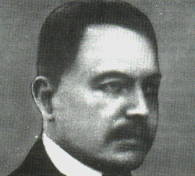
There were all kind of protest movements. In the March, 1930, his party, the Radical Party, lost the elections for federal deputies in Buenos Aires. On August 9, 1930,university people petitioned against the administration. In August and September, 1930, there was considerable unrest. On September 3,1930, the Minister of War resigned. A riot erupted on September 4th in Buenos Aires. On September 5th, the Dean of Law school asked for Yrigoyen's resignation.
General José Uriburu conspired to oust Yrigoyen. He was extremely conservative and pro-clerical. He wanted to impose order on the country, quash dissent, and force it to be unified. The Republican League and the Legion of May, a civilian group, was formed by Uriburu In August, 1930, he tried to get the support of Lisandro de la Torre, a longtime political opponent of the Radical Party and Yrigoyen, but de la Torre said no for he was afraid of military involvement in politics. The government knew of his activity, and Uriburu into hiding, but the Yrigoyen was incapable of making a decision. Uriburu failed to get support in Jockey Club, the bastion of the upper class, and the Círculo Militar, the club for the military elite. Uriburu decided to concentrate on younger officers and military cadets, the more adventuresome and brash part of the officer corps. Juan Domingo Perón, the later national leader, was part of the Uriburu plot. Most officers sat on their hands, thus giving indirect support for the coup.
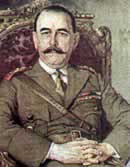
Uriburu was a poor president and he had little support. The coup was organized and carried out by a very few people. Uriburu apparently conferred several million pesos to some army officers to pay off personal debts. He ruled by decree, torture, and imprisonment and preferred a fascist state. In the first election after coup in 1931, the Radicals got the largest block of votes in Buenos Aires even though the Radicals were disgraced. Uriburu canceled the elections. Military politicians were just as factionalized as the civilian politicians and there were troop uprisings. He was forced to hold presidential elections in 1932.
General Agustín Justo won. He could hardly have lost for he ran with the support of the conservative party, the National Democratic Party, the Independent Socialists, and the Antipersonalist Radicals and Uriburu had disqualified Juan Alvear, the Radical Party candidate. Lisandro de la Torre of the Progressive Democratic Party also ran and received many if the Radical Party votes when its candidate could not run. Even so, Justo only won by one hundred thousand votes out of one million.
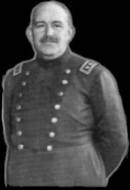
Justo was upper-class as was his vice president, Julio A. Roca, son of a former president. Justo distrusted Uriburu but used similar governing tactics. He dismissed Congress, declaring a state of siege. His administration practiced censorship of the press; intervention in the universities; and suppression of the Radical Party. His governing coalition, the Concordancia, was the old oligarchy in alliance with a large part of the military. The Concordancia ran Antipersonalist Radicals with a very conservative Vice Presidential candidate. It used the same pattern in the 1938 election when it Roberto M. Ortiz, a Radical, and the ultraconservative Ramón S. Castillo. The Chamber was controlled by Radicals and socialists but this was not enough to block the very conservative administration. The Concordancia was corrupt, determined to follow the form of elections but controlling the results through bribery and violence when necessary. It was aided by the failure of leadership on the part of Radical party. The Radicals in Buenos Aires tried revolt, an old tactic, again in December, 1932 and a couple of unsuccessful revolts later. The government suppressed them and the states of siege were frequent and long.
Labor had no great affection for the Radical Party, although the party had been its great hope years before. None of the major political parties had done much to help workers. In 1940, the average US had to work 1½ hours to buy a shirt whereas the same worker would have to work 5 hours in Argentina. Although official figures indicated that, in 1939, 64% of industrial workers and salaried workers were members of unions, this figure has to be inaccurate, inflated; perhaps 30% were.
Economic Policies. The Great Depression caused severe hardships for the Argentine economy and forced the Justo government to be very to foreign capitalists in order to protect the country. In order to increase beef and grain exports after the dramatic downturn with the collapse of the international economy, Argentina negotiated the Roca-Runciman Pact (1933; renewed in 1936) with the United Kingdom. In the Ottawa Conference, the British Empire adopted a preference system for its members, a threat to Argentina which had been a major supplier. Under the Roca-Runciman Pact, however, the British would continue to buy from Argentina in return for concessions such as low tariffs on British imports, putting British coal on the free list, favoring British capital; buying or using foreign refrigerated ships or both, and reducing Argentine-US trade. New nationalists were mad at this subservience to a foreign power and to a small segment of Argentine society. British capitalists owned the Anglo-Argentine Tramway in Buenos Aires. Argentines had begun to compete using micro busses, many of which began their runs where the trams stopped. The British capitalists complained, for they said they were not making money and the buses would block future expansion. Alfredo Palacios made a study of Anglo-Argentine Tramway Association and found that it had watered stock and made a good profit. The Argentine public screamed. The railways, which were 70% British owned, complained that they were not earning a profit but an Argentine government agency said profits were higher than the owners said but the service was poor. During the Depression, however, little would be invested in railroads.
In 1934-37, there were two investigations of the meat industry: one by a Senate Committee, the other by a Argentine-British Committee. Both decided the industry was in good shape and there was no favoritism. Both reports were a whitewash. The minority report of the Senate Committee was presented by Lisandro de la Torre. It took him five weeks to deliver; he showed complicity of Argentine oligarchy and the British capitalists. The public followed all this and got mad, but the Concordancia survived it all.
The Ortiz administration was more liberal than its predecessor. Ortiz, an Antipersonalist Radical, was dedicated to fair elections. He wrote the governor of western state that he wanted secrecy of the ballot respected. He intervened in state elections to insure fair elections. Liberals saw him as a hope. When he saw fraud occurring in the election of governor of Buenos Aires, he stopped it and got a fair election held. With regard to WWII, Ortiz favored the Allies, a stance which alarmed the conservatives. But Ortiz was a diabetic and the disease was blinding him. He stepped down in 1940.
Castillo, his successor, was an ultranationalist political dinosaur. He put in a right-wing cabinet. When Congress refused to pass the budget in 1941, he declared a state of emergency and began government by decree. More and more WWII was used as the excuse for his actions. He began preparations to run for in 1943. The army overthrew him that year and General Pedro Ramírez became interim president.
One of the key groups in the army which had been advocating an end to civilian democratic government was the Grupo de Oficiales Unidos (GOU), younger officers who wanted a strong, nationalist government. Juan Domingo Perón was a leader.
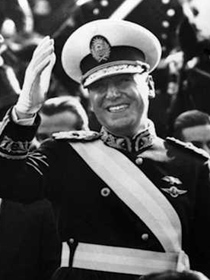
The military didn't have clear idea of what it was doing. Its general program included:
2. Anti-Semitism among some important members of army. They tied Jews with organized labor and Communism,
which was not true.
3. Dissolution of political parties for they thought party politics was inefficient and divisive.
4. A desire for national order, unity and social peace. It thought Argentine society was being torn apart.
5. Muzzling the press. It muzzled the democratic press more than pro-Axis press. There was some sympathy for Axis. Some were pro-fascist; some thought the Axis would win the war.
6. Issuing propaganda to form society as it wanted.
7. Military preparedness and spending money on the military. In the early years of the dictatorship, it apparently believed that Argentina would expand. Some wanted to conquer neighbors but never had the chance.
8. Increased stare ownership of some enterprises. In April, 1944, the government confiscated grain elevators of four companies. It got quite a bit of support. It got acquiescence from rich people in the beginning, but the army government at attacked the rich. The officer corps came from the middle and lower middle classes. The government lowered rents on Buenos Aires housing and tenant farms. Perón saw the landed oligarchy as enemies
Perón was clever and maneuvered for more power. He was under secretary of war, then secretary, head of the labor department, and then vice president. He was part of the military group that ousted Ramírez with General Edelmiro Farrell. It was cagey of Perón to see that labor was susceptible to his organization and control. By giving them goodies, he gained their support. Perón was driven by his interest in power. Although unbelievably blind about economics he was a shrewd politician. He used the term descamisados (shirtless ones) to convey his sympathy for the urban and rural working classes and the lower middle class. At political rallies, he would remove his suit jacket and rail against the oligarchy. Vice President Perón was a demagogue.
By the late summer of 1945, dissatisfaction with the military government became apparent. When the state of siege was lifted in early August, demonstrations began in favor of constitutional government. Many prominent Argentines participated. On September 25, 1945, the government arrested five university rectors, the head of the Argentine Industrial Union and the president of the Buenos Aires Stock Exchange; the next day, the state of siege was reinstituted. Then students began demonstrating. On October 9th, the military government forced him to resign. He held a rally and announced huge wage increases. He was a danger to the government so, on October 13th, it arrested Perón and held him on a island in the Río de la Plata. He would not stay long.
What saved Perón in this crisis of October, 1945? Eva Duarte, his mistress, played a role in rallying Perón's labor union and bully boys but she was not the essential force. Juan Perón invented the essential elements of Peronism; Eva only helped administer them. He was helped by the division within the armed forces. Many officers were passive. Perón had helped create the air force and they were loyal to him. Perón came off the island with military in disarray with his labor thugs flushed with success. Why didn't the army stop the demonstrators? Apparently, the military was afraid that it take a massacre of population to put down the demonstrations, and, if this happened, there would be no more support for the army.
Perón took off his uniform and campaigned for president. It was not a fair election. The Radical Party had been suppressed. The government and the peronistas interfered with the campaign. The power of the government was used to change economic conditions. No one will ever know how it would have turned out if there had been no meddling. Perón was also aided by Spruille Braden, who became US ambassador to Argentina in 1945. Braden never criticized the military government but praised representative government. It was clear that Braden and the US opposed it, however. Then the US government released a Blue Book which accused many Argentine officials, including Perón, of having been pro-Nazi. This backfired as Argentines reacted with nationalistic ire. Perón exploited anti-foreign sentiment in the 1946 presidential election by using the slogan Perón Si! Braden No!, thus wrapping himself in the Argentine flag. Perón won. He married Eva (Evita) Duarte, a media personality and a woman of uncertain reputation. He initially, he based his support on the army, reactionaries, nationalists, and some clerical groups.
Perón in Power, 1946-1955
Modern-day observers tend to romanticize Perón and his Evita but Perón ran a dictatorship. The Law of Descato, the law of disrespect, was like the Sedition Law in early US history; one could go to jail for criticizing the government. The Federal police force abused people. Perón used it as a balance against the armed forces, but, in a showdown, the army would have won.
Perón attempted to negotiate economic pacts to give Argentina economic independence, but not much came of them. Other Latin American feared peronista domination and subversion. His labor attaches intervened in other countries and tried to organize peronista labor unions. He created a Latin American labor confederation ( ATLAS).
He created the Instituto Argentino Para Intercambio (IAPI) to gain government control of exports of pastoral products. The argument was that Argentina could get the highest possible prices if there were a single seller because buyers would be forced to pay what Argentina demanded. And the country did earn unusual amounts in the meat-starved post-WWII western world, but the pastoral sectors of other economies did recover, so that the high profits could only have lasted a few years in any case. The pastoral sector was damaged because IAPI gave low prices to pastoral producers, but got high prices from buyers and Perón used the difference for social welfare and graft. The pastoral people went on strike, culling and even destroying herds. By 1950, it was obvious that it was going downhill as more and more livestock were eliminated. Compounding the worsening situation were the droughts, which wiped out large segments of the pastoral system.
He called his program justicialismo, which was a mishmash of his social and political ideas for domestic consumption and which gave him a basis for arguing that he had a his third way between capitalism and communism in international affairs. His promise to create social justice did mean that workers gained until 1950 just as it meant the tremendous growth of statism--the use of the state to own or guide economic institutions or to do both. The number of government enterprises grew rapidly as did the bureaucracy necessary to govern them. Statism grew in industry as well including the growth of military factories. The military took as much as 30% of the budget. Administrative and social welfare costs were greater. This produced more jobs he could give and strengthened his political position, but it was expensive and hard to sustain without steady increases in government revenue.
He also created the Eva Perón Foundation. It did some charity work, but there was plenty of graft. It got money from levies on private enterprise and others. Nevertheless, it and Evita were very popular with the masses, for the Peróns were giving them something and no one else ever had. He tried to run her as his vice-presidential candidate in 1951, but the military said no. Some would not allow that much power in the hands of the Peróns; some did not want a woman in such a position of power; and some had slept with her before she hooked up with Juan Perón. When Evita died young in 1952, Perón made her a martyr and tried to get her canonized. The Vatican was appalled. It bought him some political capital, for his government was faltering.
As a nationalist, he was determined to make Argentina independent of US and British capital. He aided industrialization. He bought the foreign (mostly British)-owned railroads, a squandering of capital because they were in such bad shape. He created the San Nicolás steel plant but had to use foreign capital. The problem of using foreign capital has plagued presidencies since then. Argentina needs foreign capital but nationalists have often forbade it. He started a nuclear energy program; some feared that he planned to develop nuclear weapons. His nationalistic populism, however, ran afoul of the petroleum issue.
Petroleum exploitation efforts go back to the1890s. Drillers struck oil in 1907 in Patagonia but the wells did not produce enough for Argentina's own needs. World War I brought home the need for greater production. In 1922, the Yacimientos Petrolíferos Fiscales (YPF) was created to oversee petroleum production. There were always had foreign companies in the oil business. The first head of YPF was a military men, partly because military men had greater administrative experience, partly because oil was a national treasure. Yrigoyen helped YPF build a lot of storage and refineries, led fight against foreign price rise. There was more nationalism in oil under Uriburu after 1930. In the 1930s, the domain of YPF was widely extended territorially. By 1946 YPF was directly attacking Standard Oil for mistreating Argentina or so it said. Perón ignored the fact that YPF was a nationalist symbol. He had to increase imports, for production and exploitation fell while consumption was up during his regime. In his last years, he gave concessions to foreign companies, thus opening himself up to attacks by nationalists who accused him of selling out. In four years, foreign capital had made Argentina self-sufficient in oil but nationalists destroyed the gains as they insisted that foreigners be excluded.
Not everyone liked the dictatorship; there had been numerous acts of defiance and discontent. There was an unsuccessful revolt by a small faction of the military in 1951. Students, opposition parties, the upper class, and even some labor leaders had complained about the regime. The Catholic Church backed some labor and student dissidents. Perón responded by an attack on the Church. Divorce was made legal and prostitution legalized. Then, in 1955, he ordered Congress to disestablish the Church. Naturally, the Church and its devoted adherents protested. Perón expelled some church officials after anti-government demonstrations. The Pope excommunicated Argentine government officials who had physically attacked Church personnel or its property.
He was overthrown in 1955 by the military. Perhaps the Church-State was the immediate cause. Perhaps the cause was the conflict between the military and Perón wherein the military thought Perón would arm workers. In June, 1955 there was an unsuccessful military revolt but the one which began in September was successful. By the 21st, he went into exile.
Post-Perón Political Problems
The military believed that it had to rid the country of Peronism before it could let civilians run the country. General Eduardo Lonardi was named temporary chief, followed by General Pedro Eugenio Aramburu who came to power through a palace coup. Peronists were dismissed from office and replaced by conservatives. A National Consultative Committee, representing all political parties but the Peronists, was created. They found out that Perón had accumulated $7 million in Argentina and many times more in Switzerland. The military had never liked his populism, his corruption, and the decline of the economy. Nor his sexual morality. After the coup, the military made a point of revealing that Perón was having sexual relations with a fourteen-year-old young girl. In 1955-58, President General Aramburu forbade the Peronistas from participating in politics, but it was clear that Peronistas represented a substantial part of population. The denial of their participation in public affairs meant that stability could not come to Argentina. Perón had his supporters cast blank ballot after 1955. These were counted and reported, and they were 25%-35% of the total. In the July, 1957 elections for the constituent assembly, 2.1 million people cast blank ballots almost as many as those cast for the People's Radical Party., and slightly less than that cast for the Intransigent Radical Party. The communists, by contrast, only received 225,000 votes. Part of the problem of governing after 1955 was that the Radical Party had split even further into conservative and liberal parties. One wonders why conservatives thought that peronismo would disappear. It clearly would not. No government between 1955 and 1966, when the military established a long term dictatorship, could survive without peronista support, and, because the military was adamantly opposed to the peronista movement, none could survive with it.
There was some hope that the military would allow democratic civilian government even it thought
that civilians were incompetent to run country. the 1957 constituent assembly revived the Constitution of 1853. In February, 1958
the government candidate, Ricardo Balbín of the People's Radical Party, lost to Dr. Arturo Frondizi of the Intransigent Radical Party.
The Intransigent Radicals also won control of both houses of Congress and a majority of the state
governments. He had won with support from the Peronistas. After taking office, they expected to collect.
In 1958-62, Frondizi was faced with the economic and fiscal crisis inherited from Perón. Frondizi, with U.S.
advice and the promise of financial aid, initiated a program of austerity to ""stabilize"" the economy and check
inflation. Leftists, as well as Peronistas, who still commanded strong popular support, criticized the plan because
the burden lay most heavily on the working and lower middle classes. Frondizi later fell into disfavor with the
military because of his friendliness toward the regime of Fidel Castro in Cuba and toward Peronistas at home, who, in
the congressional elections of March, 1962, scored a resounding victory. Outraged by this resurgence of Peronista strength,
the military arrested Frondizi and put José María Guido as acting president for 1962-63. New elections were held.
Dr. Arturo Umberto Illia became president for 1963-66 with only 26% of the vote. He was a moderate liberal who faced economic depression. He cancelled foreign oil contracts, a unwise move economically but a sop to the nationalists. He challenged the power of the pro-Perón Confederación General de Trabajadores. The peronistas continued to be strong, getting 35% of the vote in the 1965 congressional elections. The military, afraid that Illia was too weak to cope with Peronismo, overthrew him in 1966. The military saw itself as the savior of Argentina.
From 1966 to 1973, Argentina had a series of military governments as the military tried to "reform" the nation once and for all. General Juan Carlos Onganía (1966-70) believed that only a conservative revolution could save the nation and that people must be forced to act the way the military wanted. General Roberto Marcelo Levingston (1970-71) was more moderate. General Alejandro Agustín Lanusse(1971-73) realized that the military was making a bad job of governing and decided that civilian government was necessary. He decided to allow Perón to come home. In 1972, the old dictator was brought back from Spain. In 1973, the nation saw Ricardo Balbín of the Radical Party, lose to Héctor Cámpora, a liberal peronista. Perón had become conservative so he forced Cámpora out and a new election was held. Perón ran with his third wife, Isabela or Isabel, as his vice presidential candidate. He died in 1974.
This second Perón government (Juan in 1973-74 and Isabel in 1974-76) was not only very conservative but also undemocratic. They attacked both the liberal and the leftist opposition. Isabel was guided by astrologers. When she was overthrown, she went to jail for corruption.
General Jorge Rafael Videla. headed the military junta from 1976-81. His government is marked by brutal repression and the beginning of the "Dirty War." Perhaps as many as 30,000 were murdered or "disappeared." Some were children who were kidnapped and sold. Some went into prison.
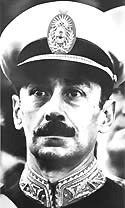
Jorge Videla
General Roberto Eduardo Viola, president in 1981, was a moderate but contended with worker demonstrations and strikes. The Dirty War continued.
General Leopoldo Galtieri was president of Argentina, December, 1981-82. His regime was marked by massive worker resistance in 1982. He started a war with Britain over the British-held Falkland Islands, which Argentina occupied in April, 1982. see "The Falkland Islands Conflict 1982. After the British recapture (June 14, 1982) of the islands, he was forced to resign, convicted of negligence, and imprisoned (1986-89). General Alfredo Oscar Saint Jean served as interim) president in 1982 followed by General Reynaldo Bignone 1982-83.
Elected President Raúl Alfonsín (1983-89) of the Radical Party prosecuted and jailed some, but not all, of the previous military rulers and their collaborators. The military as an institution would allow some of its members to be punished for public opinion demanded it but there were limits and Alfonsín knew it. He could not solve the problem of the "disappeared," and they remained an issue. He wasn't able to stop Argentina's hyper-inflation. His failures meant the election of the Peronist candidate, Carlos Saúl Menem, in the presidential elections of 1989.
Carlos Saúl Menem (1989-1999) was briefly jailed in 1956 for his role in an attempt to restore the ousted dictator Juan Perón to power. In 1973, Menem was elected governor of Rioja province but was jailed in 1976, after Juan Perón's widow, President Isabel de Perón, was toppled in a military coup. Menem was not released until 1981. He was reelected governor of Rioja province in 1983 and 1987. In 1989 he was elected president of Argentina. In 1995, he was reelected for a second term. Menem surprised many because he did not act like a peronista, that is trying to help the common man through the mechanism of the State. He reduced the size of the state, privatized business, and brought inflation under control. Nevertheless, he did not stop the massive deficit spending and foreign indebtedness and the economy fell into a depression. His efforts to seek an unconstitutional third term brought strong protests.
Former mayor of Buenos Aires Fernando de la Rua of the Unión Cívica Radical served as President in 1999-2001. He tried to cut the deficit and got aid from the International Monetary Fund but his government could not bring the economy out of depression. Late in 2001, depositors began withdrawing money from their bank accounts, fearing bank failure, so de la Rua imposed limits on withdrawals. People took to the streets to protest in such numbers that he resigned. He had been supported by the Opposition Alliance (Unión Cívica Radical and Frente por un País Solidario, or FrePaSo (Front for a Country in Solidarity) but the leader of FrePaSo, Carlos Álvarez, Vice President and President of the Senate, had to resign amidst bribery charges. The Unión Cívica Radical disgraced itself by not being willing to investigate the charges. When de la Rua fled the President's office by helicopter on December 21, 2001, it appeared the Radical Party was incompetent and/or corrupt.
Things got worse. Interim President Adolfo Rodríguez Saa lasted only a few days. He defaulted on the foreign debt because Argentina could no longer make payments. He could not get support from the state governors, powerful in twenty-first century Argentina. Then Eduardo Duhalde became President in January 2002 and began stabilizing the economy. He ended the one-to-one ratio of the peso to the dollar and the peso lost three-quarters of its value in a few months. He froze utility rates; taxed exports more heavily; and made it more difficult to collect debts. The economy improved enough that he called special elections, won by Nestor Kirchner with 22% of the vote. He took office in May, 2003.
Kirchner proved to be a very successful and popular president, He continued Duhalde's economic measures and, when inflation reached double digits, he negotiated price controls with businesses. His government also negotiated a restructuring of the foreign debt, convincing international creditors to reduce the debts substantially. It paid off its IMF obligations. The economy began growing rapidly, 8% annually. He stood up to the military and the police and had the amnesty laws protecting military officers for their actions during the Dirty War overturned. As a peronista, a follower of Justicialismo, he has not been subservient to the United States, a stance applauded by most Argentines.
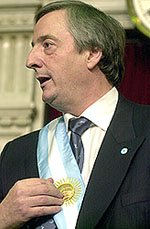
Néstor Kirchner
Kirchner became one of the most popular presidents ever; if he does not run for re-election in October, 2007, his wife, Senator Cristina Fernández de Kirchner, might. Also considering a try for the presidency was Roberto Lavagna, finance minister.
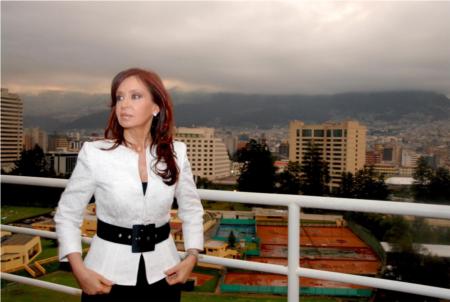
Cristina Fernández de Kirchner
Further Reading
Online
On
30th Anniversary of Argentine Coup: New Declassified Details on Repression and
U.S. Support for Military Dictatorship
22,000 people murdered or disappeared by military between 1975 and 1978
according to secret Chilean intelligence report
Kissinger
to Argentine Generals in 1976: "If there are things that have to be done,
you should do them quickly"
Newly declassified document shows Secretary of State gave strong support early
on to the military junta
Argentine Junta Security Forces Killed Disappeared Activists, Mothers and Nuns
Argentine
Military Believed U.S. Gave Go-ahead for Dirty War
New State Department documents show conflict between Washington and US Embassy
in Buenos Aires over signals to the military dictatorship at height of
repression in 1976
State
Department Opens Files on Argentina's Dirty War
New Documents Describe Key Death Squad Under Former Army Chief Galtieri
'Nunca Más' (Never Again) - Report of Conadep (National Commission on the Disappearance of Persons)
Books
Feitlowitz, Marguerite, A Lexicon of Terror: Argentina and the Legacies of Torture. New York, Oxford University Press, 1999.
Kaiser, Susana, Postmemories of Terror: A New Generation Copes with the Legacy of the "Dirty War. Palgrave Macmillan, 2005.
Rock, David P., Authoritarian Argentina: Nationalist Movement, Its History and Its Impact. Berkeley and Los Angeles, University of California Press, 2005.
Romero, Luis Alberto, A History of Argentina in the Twentieth Century. Translated by James P. Brennan. Fondo De Cultura Económica, 2006.Seoane, Maria, and Muleiro, Vicente, El Dictador: La Historia Secreta Y Publica De Jorge Rafael Videla. 4th edition. Sudamericana; 2004.
42903
Revised 32207